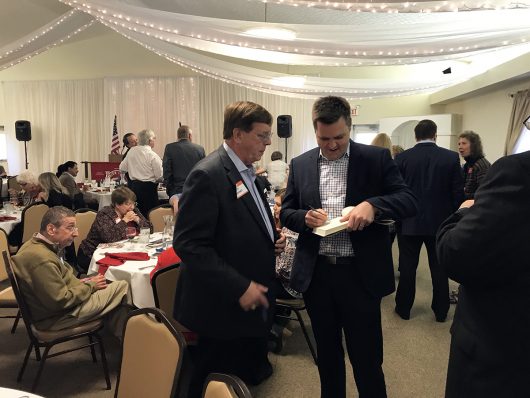
J.D. Vance signs his book, “Hillbilly Elegy: A Memoir of Family and Culture in Crisis.” Credit: Owen Daugherty | Lantern reporters
At first glance, J.D. Vance looks more like a polished startup investor than the self-proclaimed “hillbilly” the title of his book would lead one to believe. But Vance — an Ohio State alumnus who graduated 2009 and studied political science and philosophy — said he never forgot his roots and proudly embraces his rural, southern Ohio upbringing.
Vance also said in a recently published editorial in the New York Times he has decided to trade in his Bay Area abode and make the move back to Columbus with his wife, Usha. He recently spoke to The Lantern about his next moves. Vance has made clear his intentions behind the move back to Ohio — to help tackle the state’s opioid epidemic.
Vance turned his childhood — which included a drug-addicted mother, absent father and eventual upbringing by his grandmother he affectionately referred to as mamaw — into a rise to corporate success and a best-selling book, “Hillbilly Elegy: A Memoir of Family and Culture in Crisis.”
While the book chronicles his rough upbringing, it also gives insight into the struggle of working-class rural America. With the summer release of the book coinciding with the whirlwind election season, his depiction of Appalachia took on a greater level of salience.
Vance said the success of his book has surprised even himself.
“Without the book, no one would probably be listening to what I’m saying,” Vance said with a laugh.
The author’s first undertaking sat on best-seller lists for weeks and sold more than half a million copies, according to his publisher’s website. This week, it was announced that the book would get a movie deal.
Growing up in working-class Middletown, Ohio, Vance said he didn’t always see college as a possibility.
After leaving the Marine Corps at 23 years old, Vance said he saw OSU as a place that felt like home.
“OSU was a very critical part in giving me a lot of the opportunities that I’ve had since then,” Vance said. “I knew that I wanted to go to law school, but I didn’t really quite know what that required, and it was OSU’s resources that helped me figure that out … it was little things like that where the university really did help me chart my path and figure out what I wanted to do.”
After graduating, Vance attended Yale Law School and now works for Mithril Capital Management, a Silicon Valley investment firm.
“My No. 1 goal is that I would like to see fewer people getting addicted to and dying from opiates,” Vance said. “This is not a one- or two-year project. This is going to be a long-term thing … I see in five years looking back, are fewer people dying from it? Are fewer people getting addicted to this stuff?”
Through his recently founded nonprofit organization, Our Ohio Renewal, Vance said he hopes he can make a long-term impact on his home state. He has teamed up with Jai Chabria, a top strategist for Gov. John Kasich’s 2016 presidential campaign and lead organizer for the Republican National Convention recently held in Cleveland, to spread the message across Ohio.
“It’s not just Columbus, it’s not just rural Appalachia, it’s the whole state,” Vance said. “The thing that motivates me and motivates the nonprofit is that the issues I’m worried about and wrote about are pretty broadly shared among a wide population in the state.”
According to the most recent data from the CDC, analyzed by the Henry J. Kaiser Family Foundation, Vance is right. Ohio has the most deaths related to heroin — roughly one in nine across the country took place in the state, even though it has less than five percent of the nation’s total population. Ohio also holds another distinction — one in 14 deaths from synthetic opioids, most notably fentanyl, occur in the Buckeye State.
Additionally, Ohio’s opioid-related deaths have increased every year this decade.
While Vance acknowledged there is no quick fix, he said he looks to government at all levels to help implement change.
“It’s part of the solution, absolutely,” he said, referring to the political sphere. “We have to have better and smarter policy. But I also don’t think it’s gonna be a purely legislative or policy-based set of solutions … it also has to involve community members, churches, individuals. I don’t think there is a single switch that the government can flip that can make this problem better, but I certainly think they can be a part of the solution.”
Vance added that he’s not just parachuting in to try to save the region but instead sees himself as an insider, as someone who comes from the area and understands the plights.
“I’m not somebody who’s coming to these problems, because maybe I have a good heart or good intentions but I don’t really know them up close and personal,” Vance said. “I am coming at them from a very intense level of personal knowledge and familiarity with the problem.”


